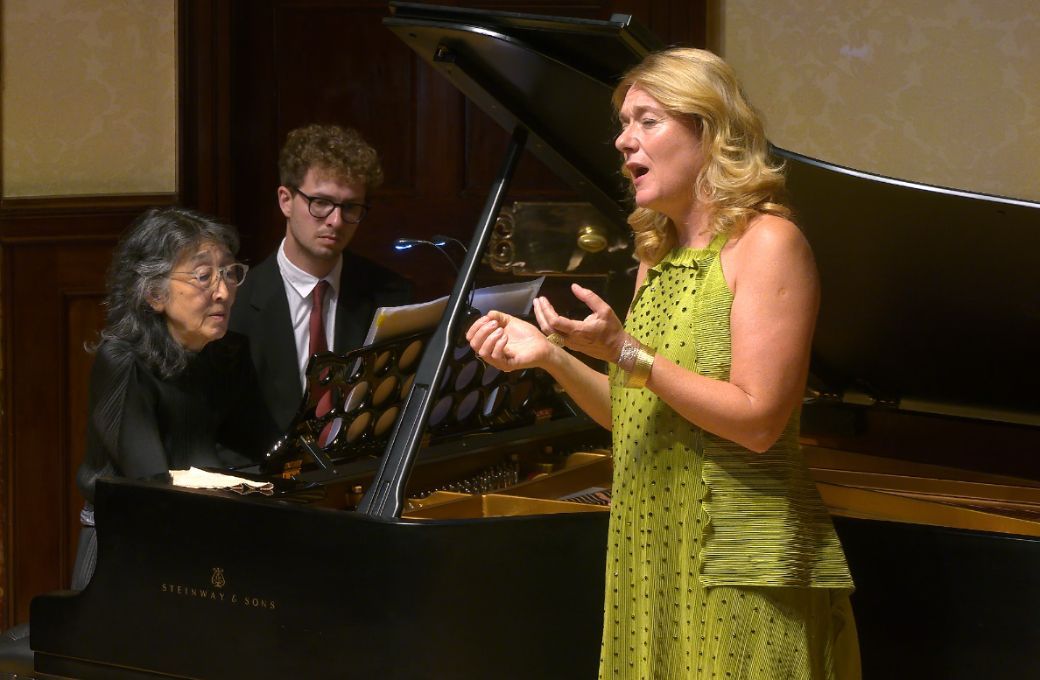This recital (repeated Monday) by Magdalena Kožená and Dame Mitsuko Uchida was largely devoted to Debussy, beginning with the Chansons de Bilitis. The eroticism of Pierre Louÿs’s bogus “ancient Sapphic discoveries” – he, not the invented Bilitis, was the author – is expressed sometimes through symbols, and sometimes more directly. Debussy had effectively completed the supreme Symbolist opera Pelléas et Mélisande by 1895, and these cycles of the next few years sound like annexes to it.

In La Chevelure (The Hair), he echoes the Tower Scene of his opera. In the second verse, as the intensity grows at “la bouche sur la bouche” (mouth on mouth), Debussy raises his prevailing piano to mezzo-forte, and at “you were entering into me like a dream” to forte then a hairpin crescendo. Kožená observed these markings with precision, interpreting the second as rising to a double forte, a thrilling sound in this responsive acoustic. We think of this music as a matter of nuance and half-lights, as much of it is, but the young composer was also working through his Wagnerisme towards a mature style.
The Baudelaire settings are similarly text-driven, alive to every subtlety even in the longest of all the composer’s songs, the six-stanza Le Balcon, its memories of warm evenings “on the balcony” evoked in voice and piano, Uchida an eloquent partner throughout and especially in the haunting postlude to the fourth stanza.
Honoured by the French government in 2003 for her services to French music, and a noted Mélisande, Kožená has very good if not perfect French, but if these poets’ love of assonance and half-rhymes are secrets kept from all but native speakers, Kožená’s vocal manner brings its own rewards. In the Ariettes oubliées Verlaine’s “extase langoureuse” (langorous rapture) was depicted as much by Kožená’s line and tone as by diction, her warm creamy mezzo-soprano timbre alluring as ever. In the rare faster number, Chevaux de bois, (Merry-go-round), both singer and pianist had fun with its repeated cries of “Tournez, tournez”.
There followed the second book of Olivier Messiaen’s song cycle, Poèmes pour Mi (1936), a gift for his first wife Claire Delbos, (“Mi” was his nickname for her). Setting poetry by Messiaen himself for “dramatic soprano and piano”, it was premiered by Wagnerian soprano Marcelle Bunlet because of her “flexible voice and extended tessitura”. They were later orchestrated for a “grand soprano dramatique” but they also need a lower range, colour and flexibility (there is much of the melisma absent from Debussy).
Kožená has all these qualities, and deployed them superbly. The closing Prière exaucée (A prayer granted) is very demanding, and was brilliantly sung and played. The climactic cries of “Donnez-moi votre grâce” (Give me your grace) were powerfully declamatory, not least in the rich piano chords. There was as much rapture in the reception as there had been in the evening's poetry. In retrospect I might have foregone one of the Debussy items to hear both books of this Messiaen cycle.


